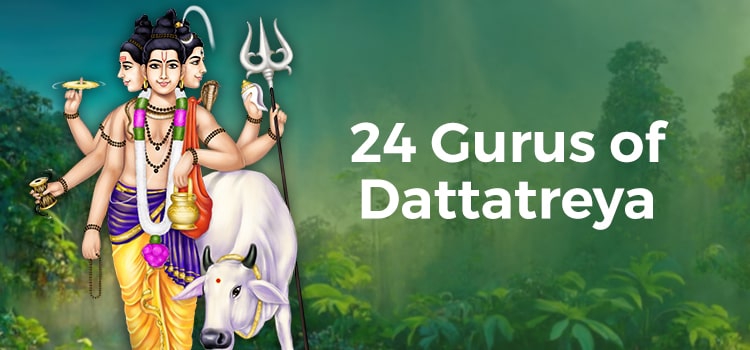The 24 Gurus of Dattatreya
Dattatreya is a Saktyavesa-Avatara, a God-empowered being who had a specific purpose to fulfill. He would travel naked and had no possessions or any destination to reach. He seemed like someone possessed due to his unpredictable bouts of laughter and crying.
In the 11th canto of Srimad Bhagavatam, Krishna refers to a conversation between King Yadu and Dattatreya. Yadu, the son of Yayathi, spotted Dattatreya in the forest and asked him about his advanced spiritual consciousness.
The king said,” I can’t understand your source of happiness. Your moods of laughing, weeping, and rolling on the floor baffle me. Why do you act so? And how come you are so happy doing such unusual activities?”
Dattatreya replied:
santi me guravo rajan
bahavo buddhy-upasritah
yato buddhim upadaya
mukto ‘tamiha tan srnu
Meaning: My dear king, I have taken shelter of many spiritual masters with my intelligence. Having received transcendental wisdom from them, I now wander about the earth in a liberated state. Please listen as I describe my gurus to you.
Dattatreya went on to explain how he achieved enlightenment by studying his 24 Siksa-gurus. They were - the earth, wind, sky, fire, moon, sun, pigeon, python, the ocean, moth, honeybee, elephant, honey collector, musk deer, fish, the prostitute named Pingala, hawk, baby, maiden, arrow-maker, snake, spider, and the wasp.
Dattatreya was not just explaining how he became enlightened. He was also revealing ways to solve modern problems through Puranic teachings. He was, in fact, propounding ideas that form the bedrock of modern environmental science and sustainable living. His ideas would definitely resonate with today’s environmental experts and scientists.

Guru One: Earth
The earth is steadfast in its duties and cycles. From the earth, we can learn the virtues of endurance and tolerance of duality. The earth feeds us even when we oppress it.
Guru Two: Wind
One should learn detachment from the wind. The wind blows both in hot and cold places. But it is not influenced by their qualities or defects. Similarly, those who seek liberation must follow the path prescribed by the Vedas, ignoring the virtues or defects of others.
Guru Three: Sky
Like the sky, the soul pervades all animate and inanimate objects. But it remains unchanged, single and steady. The sky teaches us to go beyond boundaries. It contains clouds, stars, and air but has no connection with them. We must accept the diversity within us yet remain unaffected by what we contain.
Guru Four: Water
Water cleanses others of their impurities. Man needs to renounce the impurities that are born from attachment to the physical body, seek the treasure of spiritual knowledge and cleanse people of their sins. Water flows from a higher altitude and uproots large trees. But it nurtures humble vegetation on the way down. Likewise, liberated souls should destroy those who are vain and wealthy and punish hypocrites and evildoers. They should also redeem those who surrender their sins to them. Water becomes impure due to stagnation and becomes pure as it flows. Men who are spiritual should visit holy places (Tirthakshetras) and not stay in one place.
Guru Five: Fire
Like fire, man should perform austerities and gain the light of knowledge. He should eat whatever is available, avoid bad deeds and use his virtues for a good cause only at the right moment. Man should always be pure like the fire and treat all equally. To understand the transient nature of the body, the flame of fire is seen as a Guru. One can kindle and extinguish a flame quickly. Likewise, the creation and dissolution of a body from the five cosmic elements take very little time.
Guru Six: Moon
There are totally 16 moon phases, including the subtle phase of the new moon and the 15 of the fortnight. Despite its waxing and waning, it remains unaffected by them. In the same way, changes in the body do not affect the soul. The moon phases represent the life cycle - birth, death, and rebirth – in a deeper sense.
Guru Seven: Sun
The sun stores water keeping the future in mind, and then showers it on the earth at the right moment. Likewise, man should store useful things and provide them to all living organisms impartially, as per the time, place, and prevalent conditions.
Guru Eight: Pigeons
Time will destroy those who have an intense attachment to their wife and children and feel that worldly life is pleasurable, the way a falcon preys on a pigeon and its family. Those who desire liberation must be mentally detached from worldly pleasures.
Guru Nine: Python
The python lies in one place with faith in its destiny. It is happy with the food it gets and has no particular preferences about things like quantity and taste. It does not panic if no food is available for some time, either. In the same manner, those seeking liberation should have whatever is available and maintain their faith in destiny. When nothing is available, they should meditate on the soul.
Guru Ten: Honeybee
The honeybee builds a hive high up on a tree and collects and stores honey in it. It does not eat it, and neither does it let others eat it. Finally, a honey collector takes away the hive with the honey. Likewise, a miser who accumulates wealth with difficulty can be unhappy when it perishes in a fire, stolen by thieves or seized by the king or when his unrighteous progeny misuses it, or if he dies childless. After he dies, his wealth either remains where it is or someone unrelated to him acquires it. So, one should not amass wealth.
Guru Eleven: Beekeeper
The beekeeper collects the honey effortlessly. Similarly, a male seeker should eat food cooked in a householder’s home instead of doing it himself as he will have to spend time lighting a fire, collecting pots and pans, firewood, etc. Instead, he should use that time to realize God. Seekers of liberation must take food from householders and uplift them.
Guru Twelve: Hawk
The hawk teaches us that happiness consists of sacrifice, not possession. When the Hawk finds some food and takes it in its beak, larger birds chase it. The bird will get peace only if it lets go of the food. Likewise, we should pursue spiritual goals (peace) rather than materialistic goals (food) for happiness.
Guru Thirteen: Ocean
The sea is neither pleased if the rivers bring in plenty of water during the monsoons nor is it displeased if they do not. It does not swell or shrink. Similarly, man should be steadfast in his duties and should not feel elated due to worldly pleasures or unhappy if he faces tragedy. He should always remain calm and immersed in bliss.
Guru Fourteen: Moth
The light of a lamp attracts a moth that dives at it and is charred to death. Likewise, a man who falls for a woman’s beauty and youth for the sake of sexual pleasure will perish like the moth.
Guru Fifteen: Elephant
The elephant teaches us to be careful when it comes to our aims and desires. During the mating season, a male elephant got the smell of a female elephant in a pit. The male jumped into the pit due to his desire for sex. But the pit was a trap laid by a hunter, and the elephant lost its life. Similarly, when sensuous pleasures tempt man, he will be trapped in bondage.
Guru Sixteen: Musk Deer
The musk deer is as fast as the wind and is not easy to capture. But it is enchanted by melodious music, like the flute of a hunter, and loses its life. So, one should not get trapped in any form of attachment.
Guru Seventeen: Fish
The fish teaches us to avoid greed. The fish in the river or ocean is caught using a worm or meat on the hook as bait. Controlling our appetites is essential; otherwise, our desires will trap us. One way to do it is to control food. Other senses will also come under control automatically once the food habit is controlled.
Guru Eighteen: Prostitute
One night Pingala, the prostitute, waited for long for a client. But no one came. Finally, she got bored and developed detachment. Desires rob us of peace. Those who sacrifice desire will be unaffected by sorrow. Pingala also teaches us to live a life of dignity. Pingala was disgusted with her life. So she decided to devote the rest of her life to God.
Guru Nineteen: Child
When hungry, a child cries and stops when her mother feeds her. The child is innocent and does not feel materialistic desires or anxiety. We should live carefree, like a child.
Guru Twenty: Maiden
The maiden teaches to focus. She works continuously to cook food, clean the house, and wash the dishes and clothes. She does her duty with complete dedication. The materialistic world tends to distract us from the spiritual world. So we should focus on God.
Guru Twenty-one: Snake
The snake teaches us to adapt to our surroundings. It does not have its own burrow. Instead, it lives in other creatures’ abandoned burrows. Likewise, we will get many places to rest even if we do not have a permanent house.
Guru Twenty-two: Arrowsmith
Once, an arrowsmith was so focused on his task that he did not realize it when the king and his army passed by. If you focus on your task, the materialistic world will not distract you. We can learn how to focus from the arrowsmith.
Guru Twenty-three: Spider
The spider spins a web by secreting a fluid from its belly. It catches prey that get entangled in the web. When it wants to, it swallows the web and becomes free again. In the same way, God creates the world when he wants and performs various kinds of play in it. When he wants to, he destroys it and becomes single again. Thus, God can create and destroy the world at will. Hence we should not attach any importance to worldly things.
Guru Twenty-four: Wasp
Those who regularly meditate on an object will merge into it finally. The wasp creates a house from mud and places a worm in it. It blows air over the worm lightly now and then. The worm meditates and finally becomes a wasp. A seeker who wants liberation should, likewise, meditate on God, as per the Guru’s advice, so that he merges with God.
Why So Many Gurus?
Dattatreya told King Yadu that one Guru is enough to attain self-realization, but he wanted to perceive the unity of the soul principle in all creatures, animate and inanimate. So, he imbibed their qualities by seeing them as his Gurus. The spiritual knowledge he received from his Guru was strengthened when he chose these various qualities as Gurus.
To experience Brahman by turning away from Maya (illusion), one Guru is enough. At this time, the seeker’s spiritual journey is from the Muladhar-chakra to the Crown chakra in the spiritual energy system. However, this is only half of the total spiritual journey that a seeker needs to undertake. To experience Brahman within Maya, one needs to be skilled in a number of things in Maya; because ‘Excellence in Karma is Yoga’. If one is to perform various activities well in Maya, one needs to imbibe various qualities that are specific to those activities. When one acquires these qualities, one’s spiritual journey is complete. Then, one can experience Brahman and also work in Maya simultaneously at the level of various chakras (Chakra is the center in the body through which spiritual energy flows). One can experience bliss while one is at the level of any chakra - from the first to the last chakra.



















